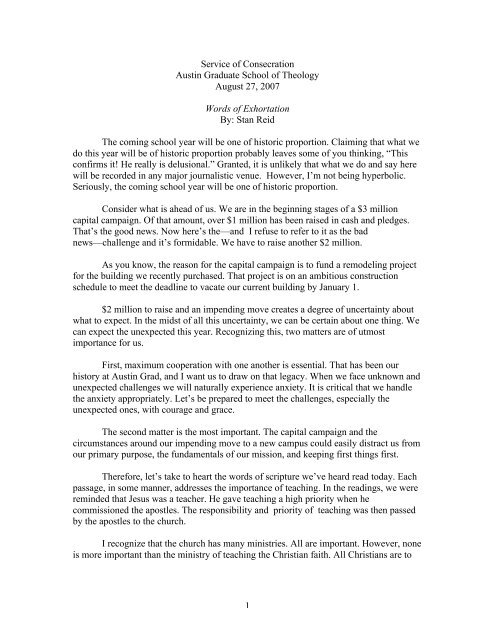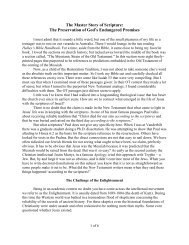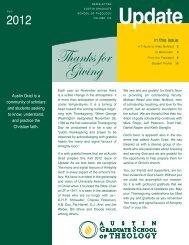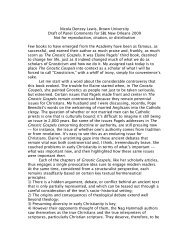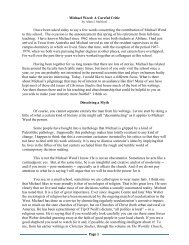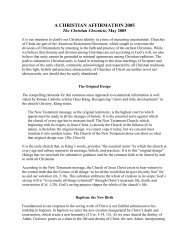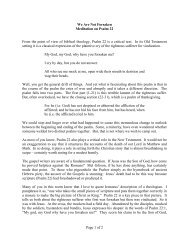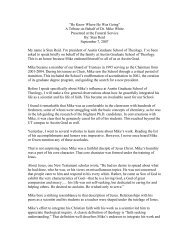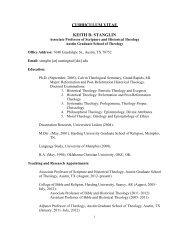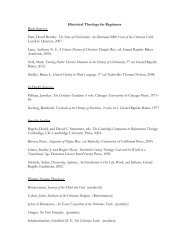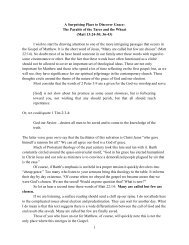Words of Exhortation - Austin Graduate School of Theology
Words of Exhortation - Austin Graduate School of Theology
Words of Exhortation - Austin Graduate School of Theology
Create successful ePaper yourself
Turn your PDF publications into a flip-book with our unique Google optimized e-Paper software.
Service <strong>of</strong> Consecration<br />
<strong>Austin</strong> <strong>Graduate</strong> <strong>School</strong> <strong>of</strong> <strong>Theology</strong><br />
August 27, 2007<br />
<strong>Words</strong> <strong>of</strong> <strong>Exhortation</strong><br />
By: Stan Reid<br />
The coming school year will be one <strong>of</strong> historic proportion. Claiming that what we<br />
do this year will be <strong>of</strong> historic proportion probably leaves some <strong>of</strong> you thinking, “This<br />
confirms it! He really is delusional.” Granted, it is unlikely that what we do and say here<br />
will be recorded in any major journalistic venue. However, I’m not being hyperbolic.<br />
Seriously, the coming school year will be one <strong>of</strong> historic proportion.<br />
Consider what is ahead <strong>of</strong> us. We are in the beginning stages <strong>of</strong> a $3 million<br />
capital campaign. Of that amount, over $1 million has been raised in cash and pledges.<br />
That’s the good news. Now here’s the—and I refuse to refer to it as the bad<br />
news—challenge and it’s formidable. We have to raise another $2 million.<br />
As you know, the reason for the capital campaign is to fund a remodeling project<br />
for the building we recently purchased. That project is on an ambitious construction<br />
schedule to meet the deadline to vacate our current building by January 1.<br />
$2 million to raise and an impending move creates a degree <strong>of</strong> uncertainty about<br />
what to expect. In the midst <strong>of</strong> all this uncertainty, we can be certain about one thing. We<br />
can expect the unexpected this year. Recognizing this, two matters are <strong>of</strong> utmost<br />
importance for us.<br />
First, maximum cooperation with one another is essential. That has been our<br />
history at <strong>Austin</strong> Grad, and I want us to draw on that legacy. When we face unknown and<br />
unexpected challenges we will naturally experience anxiety. It is critical that we handle<br />
the anxiety appropriately. Let’s be prepared to meet the challenges, especially the<br />
unexpected ones, with courage and grace.<br />
The second matter is the most important. The capital campaign and the<br />
circumstances around our impending move to a new campus could easily distract us from<br />
our primary purpose, the fundamentals <strong>of</strong> our mission, and keeping first things first.<br />
Therefore, let’s take to heart the words <strong>of</strong> scripture we’ve heard read today. Each<br />
passage, in some manner, addresses the importance <strong>of</strong> teaching. In the readings, we were<br />
reminded that Jesus was a teacher. He gave teaching a high priority when he<br />
commissioned the apostles. The responsibility and priority <strong>of</strong> teaching was then passed<br />
by the apostles to the church.<br />
I recognize that the church has many ministries. All are important. However, none<br />
is more important than the ministry <strong>of</strong> teaching the Christian faith. All Christians are to<br />
1
e taught starting prior to conversion on to initiation into the Christian way, and<br />
throughout the remainder <strong>of</strong> life.<br />
All are to be taught. However, not all are called to be teachers. Historically, the<br />
church has set aside and called those gifted and equipped to pass on the faith. In time, the<br />
church established schools or seminaries to teach and train those it called to be its<br />
ministers, teachers, and preachers. Our <strong>School</strong> plays an important role in that<br />
undertaking.<br />
Recognizing the danger <strong>of</strong> distraction in the coming school year we will focus on<br />
our primary purpose. Doing that requires us to give attention to outcomes. We need to<br />
focus on outcomes not only because our accrediting agency expects it, but because we are<br />
concerned about how well we are fulfilling our mission to educate Christian servants and<br />
edify churches.<br />
An anecdote will verify this concern. In his essay in The Art <strong>of</strong> Reading Scripture,<br />
Pr<strong>of</strong>essor L. Gregory Jones recalls a sobering moment regarding outcomes. Each<br />
semester at the seminary where he teaches, students taking the homiletics class anxiously<br />
wait for the day their preaching texts will be assigned. Most students express their fear <strong>of</strong><br />
being assigned the text about Balaam’s ass or some obscure text from Chronicles. They<br />
all hope for a more familiar text like the Parable <strong>of</strong> the Prodigal, etc.<br />
Pr<strong>of</strong>essor Jones stood back and watched as the assignment list was posted.<br />
Anxious students gathered around. He recalls one student loudly complaining about his<br />
assigned text being from the book <strong>of</strong> Hebrews because “he had hoped to get a text from<br />
the New Testament!” The pr<strong>of</strong>essor confides that he has <strong>of</strong>ten wondered about the impact<br />
<strong>of</strong> that student’s ministry to the church.<br />
Yes, we must be concerned about student outcomes this year because we are<br />
entrusted with equipping them to serve the church and the world. Although it is not<br />
always popular and some students struggle to pass, it is good that we have a rigorous<br />
Bible Content Exit Exam. Equipping our students to appropriately interpret and apply the<br />
Bible to, for, and with the church is at the heart <strong>of</strong> our purpose.<br />
This primary purpose can be traced back to our beginnings. In 1918, the<br />
forefathers <strong>of</strong> our <strong>School</strong>, set about teaching Bible for credit through an arrangement with<br />
the University <strong>of</strong> Texas. We are far removed from those days. Although we no longer<br />
have the arrangement with UT, I’m confident that the outcomes we seek are similar to<br />
those <strong>of</strong> our ancestors.<br />
We aim for our students to have greater knowledge <strong>of</strong> the Bible. However,<br />
biblical knowledge alone is inadequate. Biblical knowledge must be married to a better<br />
understanding <strong>of</strong> the historic Christian faith. Even then, the outcome will be less than<br />
what is required for faithful ministry in the church and world unless knowledge and<br />
understanding is wedded to faithful practice in the church and world. According to<br />
John’s gospel, loving Jesus is the true test <strong>of</strong> one’s practice <strong>of</strong> the faith. We show our<br />
2
love for Jesus when our lives (i.e., our practice <strong>of</strong> the faith) are shaped according to<br />
Jesus’ life.<br />
Therefore, it is important for us to enable our students to know the Bible and<br />
understand the faith so they can more fully practice or live the faith. In turn, they will be<br />
equipped to pass on the faith through effective teaching and preaching. Today, we are<br />
being consecrated to serve Jesus through the mission <strong>of</strong> our <strong>School</strong>. Let’s seek to hear a<br />
word from the Lord based on our earlier reading <strong>of</strong> John 21:15-17. May it help us<br />
remember our primary purpose. May it keep us focused on our fundamental mission.<br />
May it lead us to keep first things first.<br />
In the context <strong>of</strong> our scripture reading we find the disciples gathered around Jesus<br />
on the lakeshore. The resurrected Jesus called them together around a small fire where he<br />
has prepared them breakfast. As I imagine the scene, I see the disciples experiencing<br />
mixed emotions that morning; excitement and anxiety, anticipation and fear. Surely these<br />
were acute for Peter.<br />
Jesus pointedly queries Peter three times about the depth <strong>of</strong> his love for and<br />
commitment to him. The three questions are matched by three charges. In these charges<br />
we see that love for Jesus is practiced by feeding and tending his flock. A key<br />
qualification for this task is a love for Jesus characterized by dependence, humility, and<br />
obedience.<br />
As you know, the shepherd metaphor Jesus uses has a long history <strong>of</strong> application<br />
in the Ancient Near East and especially in the Old Testament. The shepherd’s task<br />
included guiding the flock to good pasture and water, and protecting the sheep from<br />
predators and guarding them from their own tendency to wander into dangerous places.<br />
This guidance required the shepherd to know the terrain well.<br />
In terms <strong>of</strong> applying this image to our situation, I have nothing new or pr<strong>of</strong>ound<br />
to <strong>of</strong>fer. However, let’s use the image <strong>of</strong> the shepherd to remind us <strong>of</strong> our opportunities<br />
and responsibilities in the new school year.<br />
First, let’s give attention to the central role our faculty plays in the fulfillment <strong>of</strong><br />
our mission. Their work is a serious responsibility and largely determines the outcomes<br />
we considered earlier. Through their teaching our faculty will instruct, equip, and even<br />
correct those who would serve God by ministering, teaching, and preaching in the church.<br />
It is crucial that the content <strong>of</strong> their teaching be right and that the manner <strong>of</strong> delivery be<br />
humble and obedient. Both content and manner reflects their love for Jesus. Speaking <strong>of</strong><br />
outcomes, innumerable people and churches will be affected by our pr<strong>of</strong>essors through<br />
our graduates. A majority <strong>of</strong> these people and churches will remain unseen and unknown<br />
to us. The potential <strong>of</strong> this far reaching impact is stunning and humbling.<br />
Although the faculty’s role is central, it does not mean their role is superior to that<br />
performed by the staff and administration. These servants work quietly among us. They<br />
are <strong>of</strong>ten less visible, but this does not mean their work is less important. The staff and<br />
3
administration have contact with our students in settings other than the classroom. This<br />
allows them to become conduits <strong>of</strong> communication within the <strong>School</strong>. This<br />
communication is very important, but we must be on guard and use wisdom lest it<br />
degenerate into gossip.<br />
Regarding communication, let’s all remember to follow <strong>of</strong>ficial procedure when<br />
dealing with problems. Academic matters should be addressed first to the academic<br />
department head. Behavioral matters are addressed to the Dean <strong>of</strong> Students. Once again,<br />
the staff and administration have a unique role in shepherding our students. Like the<br />
faculty, your manner <strong>of</strong> dealing with the students will reflect your love for Jesus.<br />
I’m pleased that our student association <strong>of</strong>ficers are with us today. They are in the<br />
unusual situation <strong>of</strong> being both sheep and shepherds within our <strong>School</strong> network. These<br />
<strong>of</strong>ficers will see and hear things the remainder <strong>of</strong> us will not. Admittedly, we’ll not want<br />
to see or need to hear everything. However, the student <strong>of</strong>ficers can be the eyes and ears<br />
<strong>of</strong> the <strong>School</strong>. Not in the sense <strong>of</strong> being spies, but in the sense <strong>of</strong> noticing needs and<br />
helping initiate the proper response. These <strong>of</strong>ficers also have the difficult, but important<br />
task <strong>of</strong> helping us build community at the <strong>School</strong>. I urge them to work with us so that we<br />
all will live up to our high calling.<br />
The coming school year will be one <strong>of</strong> historic proportion. I am convinced our<br />
love for Jesus, our care for these students from his flock, and our commitment to the<br />
mission <strong>of</strong> this <strong>School</strong> will inspire us to work with maximum cooperation. Although there<br />
will be numerous distractions this year, let’s remember our primary purpose and keep<br />
first things first by focusing on our fundamental mission. Our aim, like that <strong>of</strong> our<br />
forefathers at this <strong>School</strong>, is to teach and guide our students to greater biblical knowledge<br />
and a better understanding <strong>of</strong> the historic Christian faith. With this knowledge and<br />
understanding they will be enabled to more fully practice and live the faith. In turn, they<br />
will be equipped to pass on the faith to innumerable people and churches. Such an<br />
outcome is worthy <strong>of</strong> our best efforts this year. I look forward to seeing how the Chief<br />
Shepherd uses each <strong>of</strong> us to nurture the flock given to our care at <strong>Austin</strong> Grad during the<br />
2007-2008 school year.<br />
4


